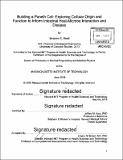Building a paneth cell :
Author(s)
Mead, Benjamin E.(Benjamin Elliott)
Download1108621637-MIT.pdf (19.83Mb)
Alternative title
Exploring cellular origin and function to inform intestinal host-microbe interaction and disease
Other Contributors
Harvard--MIT Program in Health Sciences and Technology.
Advisor
Jeffrey M. Karp.
Terms of use
Metadata
Show full item recordAbstract
Understanding how our bodies interact with our resident gut microbes may unlock new therapies for multiple diseases. However, we presently lack representative models to study such interactions, limiting therapeutic development. Here, we advance methods of cellular bioengineering to create high-fidelity models of intestinal cell types, in particular the microbe-interfacing antimicrobial Paneth cell. With this model, we study at scale molecular interventions that direct Paneth cell development and function as a means to modulate our gut microbes in health and disease. Multiple diseases are linked to alterations in Paneth cell function and the composition of the gut bacteria, including inflammatory bowel disease. Past studies of Paneth cells have relied on complex and poorly scaled animal models, or limited in vitro models, including stem cell-derived organoids. The extent to which in vitro models of Paneth cells reproduce in vivo biology is an unanswered question central to their utility in studying host-microbe interaction for therapeutic development. We first present a generalizable approach using single-cell RNA sequencing to compare the identity of in vivo Paneth cells to those of in vitro organoids and based on lineage-defining differences between the two, nominate small molecule interventions to improve model representation. We then validate our improved Paneth cell model through rigorous characterization and a demonstration of functional (antimicrobial activity, niche support) improvements in Paneth cell physiology following our intervention. With this high-fidelity Paneth cell model, we built a scalable platform to study interventions which may enhance cell function and development. As a proof-of-concept screen, we use a well-defined and clinically-relevant set of small molecules to identify drugs that enhance Paneth cell differentiation and antimicrobial function. We validate the most potent drugs with additional analyses, revealing multiple molecular targets that may serve as therapeutic candidates to restore Paneth cells in disease or act as a new approach to therapeutically shape the gut microbiota.
Description
Thesis: Ph. D. in Medical Engineering and Medical Physics, Harvard-MIT Program in Health Sciences and Technology, 2018 Cataloged from PDF version of thesis. Includes bibliographical references (pages 120-133).
Date issued
2018Department
Harvard--MIT Program in Health Sciences and Technology; Harvard University--MIT Division of Health Sciences and TechnologyPublisher
Massachusetts Institute of Technology
Keywords
Harvard--MIT Program in Health Sciences and Technology.
